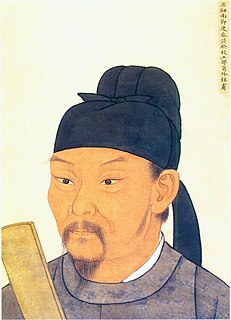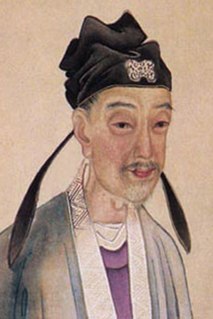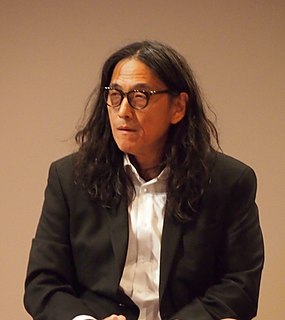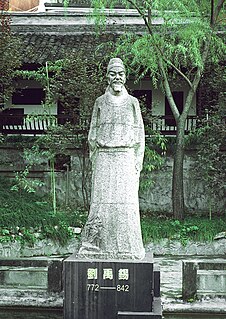
The Banished Immortal: A Life of Li Bai is a biography of Li Bai by Ha Jin that was published in 2019 by Pantheon. [1]
The author wrote his own translations of the poems, [2] as well explanations of the meanings of Li Bai's poems. [3]

The Banished Immortal: A Life of Li Bai is a biography of Li Bai by Ha Jin that was published in 2019 by Pantheon. [1]
The author wrote his own translations of the poems, [2] as well explanations of the meanings of Li Bai's poems. [3]
Publishers Weekly stated that it was a "polished biography" that would allow audiences to learn more about Li Bai. [3]
Kirkus Reviews stated that the book had "little of the vigor of his subject." [2] Kirkus praised the translations but not the explanations, stating that they were not profound. [2]

Li Bai, also known as Li Bo, courtesy name Taibai, art name Qinglian Jushi, was a Chinese poet, acclaimed from his own time to the present as a brilliant and romantic figure who took traditional poetic forms to new heights. He and his friend Du Fu (712–770) were two of the most prominent figures in the flourishing of Chinese poetry in the Tang dynasty, which is often called the "Golden Age of Chinese Poetry". The expression "Three Wonders" denotes Li Bai's poetry, Pei Min's swordplay, and Zhang Xu's calligraphy.
The Eight Immortals of the Wine Cup or Eight Immortals Indulged in Wine were a group of Tang Dynasty scholars who are known for their love of alcoholic beverages. They are not deified and xiān is metaphorical. The term is used in a poem by Du Fu, as well as in the biography of Li Bai in the New Book of Tang.

Du Fu was a Chinese poet and politician of the Tang dynasty. Along with his elder contemporary and friend Li Bai, he is frequently called the greatest of the Chinese poets. His greatest ambition was to serve his country as a successful civil servant, but he proved unable to make the necessary accommodations. His life, like the whole country, was devastated by the An Lushan Rebellion of 755, and his last 15 years were a time of almost constant unrest.

Bai Juyi, courtesy name Letian, was a renowned Chinese poet and Tang dynasty government official. Many of his poems concern his career or observations made about everyday life, including as governor of three different provinces. He achieved fame as a writer of verse in a low-key, near vernacular style that was popular throughout China, in Korea and Japan.

Li Shangyin, courtesy name Yishan, was a Chinese poet and politician of the late Tang dynasty, born in the Henei Commandery. He is noted for the imagist quality of his poems and his "no title" style of poetry. Li Shangyin has been frequently anthologized, and many of his poems have been translated into various languages, including several collections in English.

Li-Young Lee is an American poet. He was born in Jakarta, Indonesia, to Chinese parents. His maternal great-grandfather was Yuan Shikai, China's first Republican President, who attempted to make himself emperor. Lee's father, who was a personal physician to Mao Zedong while in China, relocated his family to Indonesia, where he helped found Gamaliel University. In 1959 the Lee family fled Indonesia to escape widespread anti-Chinese sentiment and after a five-year trek through Hong Kong and Japan, they settled in the United States in 1964. Li-Young Lee attended the University of Pittsburgh, the University of Arizona, and the State University of New York at Brockport.
Three Chinese Poets is a book of poetry by the titular poets Wang Wei, Li Bai and Du Fu translated into English by Vikram Seth. The Three Poets were contemporaries and are considered to be amongst the greatest Chinese poets by many later scholars. The three have been described as a Buddhist recluse, a Taoist immortal and a Confucian sage respectively. Though this trichotomy has been criticised as simplistic and artificial, it can act as a guiding approximation. They lived in the Tang Dynasty and the political strife at that time affected all of their lives very much and this impact is evident in the poetry of all three.

Peter Dale Scott is a Canadian-born poet, academic, and former diplomat. A son of the Canadian poet and constitutional lawyer F. R. Scott and painter Marian Dale Scott, he is best known for his critiques of deep politics and American foreign policy since the era of the Vietnam War. Notably, he was a signatory in 1968 of the "Writers and Editors War Tax Protest" pledge, in which participants vowed to refuse tax payments in protest against the Vietnam War. Although trained as a political scientist, Scott holds an atypical academic appointment as a poet-scholar in an English department.

Liu Yuxi (772–842) was a Chinese poet, philosopher, and essayist, active during the Tang Dynasty.

The Temple of the Five Lords, also known as the "Temple of the Five Officials", is a memorial shrine to five exiled officials from the Tang and Song dynasties that is located to the southeast of the city of Haikou on the island of Hainan, China. During the times of these dynasties, Hainan was perceived as a remote part of the empire and was used as a place for banishment for disgraced court officials. All five officials commemorated at the temple encountered such a fate, typically after losing power struggles within the imperial court.

The Peach Blossom Spring, or Peach Blossom Spring Story or The Peach Blossom Land was a fable written by Tao Yuanming in 421 CE about a chance discovery of an ethereal utopia where the people lead an ideal existence in harmony with nature, unaware of the outside world for centuries. The phrase can be used to describe a idealistic place of beauty and repose, although it is sometimes used to refer to an unrealistic dream.
Jenn Bennett is an American author of novels for teens and adults. Her notable works include Alex, Approximately, Starry Eyes, and The Anatomical Shape of a Heart. Her books have received critical acclaim and award recognition.

The Journey of Flower is a 2015 Chinese television series starring Wallace Huo and Zhao Liying. It is based on the fictional novel of the same name written by Fresh Guoguo, which is inspired from Daoist legends regarding the path to immortality. The series was broadcast on Hunan TV every Wednesdays and Thursdays for two episodes per day, from 9 June to 7 September 2015.
Lucha Corpi is a Chicana poet and mystery writer. She was born on April 13, 1945 in Jaltipan, Veracruz, Mexico. In 1975 she earned a B.A. in comparative literature from the University of California, Berkeley. In 1979 she earned a M.A. in comparative literature from San Francisco State University. Corpi's most important contribution to Chicano literature, a series of four poems called "The Marina Poems ," appeared in the anthology The Other Voice: Twentieth-Century Women's Poetry in Translation, which was published by W. W. Norton & Company, in 1976 (ISBN 9780393044218).
Jin Yi (1770–1794) 金逸 courtesy name Xianxian 纖纖, was a Qing dynasty poet from Suzhou. Born into a local gentry family, she demonstrated remarkable talent at a very young age, and surpassed all her brothers when learning to compose poetry. Considered one of the most talented students of Yuan Mei, 108 of her poems were included in his anthology of works by his female students, the Suiyuan nüdizi shixuan. In his eulogy of Jin Yi, Yuan Mei wrote: “At a very early age she could already read books and distinguish the four tones. She loved to compose poetry, and every time she let fall her brush it was like a fleet horse prancing along unable to talk.” A contemporary Qing poetess, Wang Zhenyi, considered her to be an emblematic "banished immortal", akin to Li Bai. Jin Yi's complete collection of poetic works in four volumes was titled Shouyinlou Shicao.

Eternal Love, also known as Three Lives, Three Worlds, Ten Miles of Peach Blossoms, is a 2017 Chinese television series starring Yang Mi and Mark Chao. It is based on the xianxia novel of the same name from 2015 by Tang Qi Gong Zi. The series was broadcast on Zhejiang TV and Dragon TV from 30 January to 1 March 2017.
Little White Duck: A Childhood in China is a 2012 non-fiction graphic novel written by Na Liu and illustrated by her husband, Andrés Vera Martínez; Graphic Universe is its publisher. It discusses Na Liu's childhood in China during the 1970s and 1980s.
Boy in the Twilight: Stories of the Hidden China is a collection of thirteen short stories written by Yu Hua in the mid-1990s, and published in 1999. The English version, translated by Allan H. Barr, was published in 2014 by Pantheon. This was the sixth work of his that was translated into English. Barr teaches Chinese at Pomona College.

The Good Son is a novel by You-Jeong Jeong, first published in South Korea in 2016 by Eunhaengnamu (ISBN 9788956609959). It was translated into English by Chi-Young Kim, with the translation published in 2018 by Little Brown Book Group. This is the first Novel by Jeong to have an official English translation; the author created three novels prior to this one. Hachette India published the book in English in that country.
The Accusation is a short story collection by Bandi.